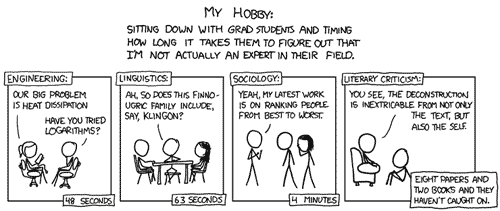God, hes left as on aur oun.
In Soviet criticism, terms come to you!
Catherynne Valente went on a mild tear about “speculative fiction” which itself went and garnered just about a hundred comments in the first hour of its existence. Apparently, people like jawing over jargon! Who knew?
What’s interesting, about the rant and its responses, is how subtly different everyone’s idea of speculative fiction is. Which, granted, is true of almost all genera, by definition (if people remembered the same they would not be different people; think and dream are the same in French). —Valente (and some, if not most) sees it as a failed attempt at a big tent, a fantastika whose clinical air of technical specificity (these fictions, and their speculations) renders it incapable of embracing the messy, ugly, gloriously squishy numinosity of fantasy as she is wrote. —Others, including, well, me, see it as—and maybe it’s the folk etymology I’ve concocted in my own head? See, when the New Wave came along, people started casting about for something to call the stuff that was inarguably in the same basic arena as science fiction but wasn’t, how you say, strictly scientific, was insufficiently hard, and so some folks started to call it sci-fi as a way of making the allegiance clear while downplaying the whole science aspect of it, but then Harlan Ellison threatened to punch them, so they had to call it something else instead, and they settled on speculative fiction. Which is fine enough at what it does, but what it does is kinda wishy-washy, has no convictions to lend it courage, and lets people like Margaret Atwood reify their own takes on McCarty’s Error (“To label The Sparrow science fiction,” he said in his age-old review, “is an injustice and downright wrong”) with their hairsplitting games of science fiction and speculative fiction: it’s the travesty of porn and erotica all over again. —Any genre distinctions that hinge on de gustibus questions of “quality” are worse than useless.
Anyway, there’s a lot of people unhappy with “speculative fiction” as a term, almost as many as are unhappy with “graphic novel” (and luckily speculative fiction even after all these years isn’t nearly so firmly rooted as that other ugly compound). But there’s still the question of what to call the stuff that’s obviously “science fiction” but that isn’t strictly speaking sciencey; how do those of us who do not wish to be punched by Harlan Ellison meaningfully name and situate something like Star Trek without drowning in eye-rolling trolls who simply cannot resist pointing out how wrong it is to have sound in space? —Well, you wear the original term down further: from scientifiction to science fiction to sci-fi to SF, which (sigh) is an acronym, and leads to ugly coinages like “SFnal,” but has the signal advantages of: being immediately recognizable; not insisting on science; not being “speculative fiction.”
So I mentioned as much, over on the Twitter, my preference for SF, and @catvalente immediately pointed out the silent F therein. —Which brought me up short; I’d never thought of speculative fiction as kitchen-sinking fantasy qua the phantastick: fables and myths and the very best magic aren’t speculations, they’re demands; not games of WHAT IF, but DAMN WELL IS. So I see no problem replacing speculative fiction with SF; they do roughly the same job for me; that silent F wasn’t silent but always ever elsewhere. —Yet of course there are going to be those who do try to make the term as inclusive as it pretends to want to be on the tin, and will be caught up short by its shortcomings. And so.
(Once more, I’m driven to mock an old XKCD strip:
(Hard sciences? Ha! Working with objectively measurable quanta is easy.)
—Where was I? Oh. Musing that maybe I shouldn’t be quite so sloppy with terminology when throwing these words about. —Not that I’m likely to get less sloppy, but I should at least point to the pier’s mission statement (or mission essay, we don’t really go in for pith in this sort of thing) in this regard, “Ludafisk”: critical definitions of such things as genres can never be necessary or sufficient; are, like tools, highly situational; therefore, like tools, are to be put down and taken up again as needed. I could, I suppose, be a little more clear when I’m switching from flat-head to Phillips, say. Try to be, anyway.
(I keep kicking around a classification or hierarchy of terms, of modes, say, for SF and fantasy and horror considered as part of the triskelion; of idioms, referring to SF furniture or fantasy furniture, working with ray-guns-and-rocket-ships or rings-and-swords-and-cloaks, of genres being those contractual obligations such as steampunk or urban fantasy. But I keep resisting. So pretend I said nothing.)
—I would be remiss to those of you who follow along via RSS if I didn’t point out that in earlier entries in this occasional series old friend of the pier Charles S has been doing a yeoman’s job of chiding and chivvying and generally teasing the most interesting bits out for further consideration. So.
















I thought consensus held Star Trek to be “space opera.”
My personal definition of “speculative fiction” combines sociology, politics, drugs, paranoia, and hyper-realities. IOW, I’m a child of the 80s.
Good Lord, sir. Trek is far too square and straitlaced ever to be considered opera of any sort!